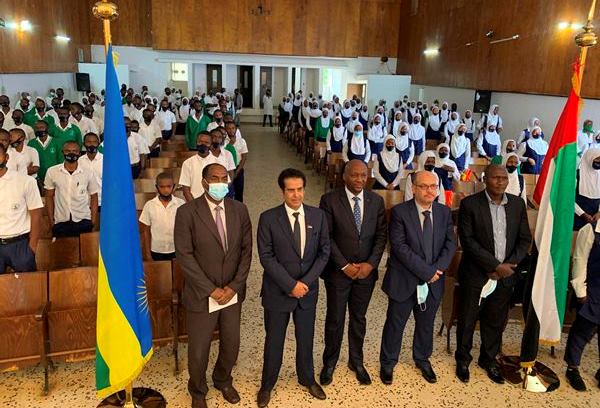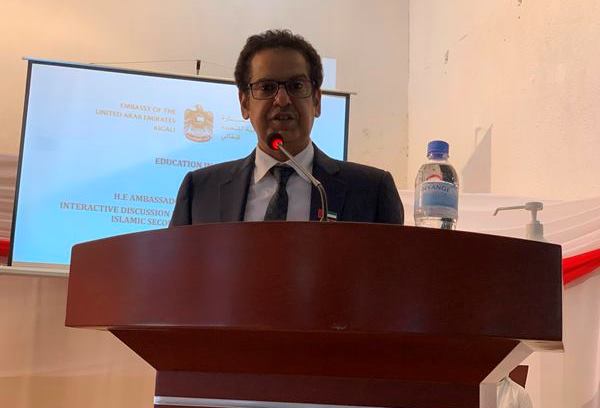
Photo group with students and teachers
H.E. Hazza Alqahtani, Ambassador of the United Arab Emirates (UAE) today visited Students & Teachers at the Islamic Secondary School for Sciences (ESSI) and talked about Education in his country. Read below his presentation:
A very good afternoon to you all, especially to our young students and our much respected teachers. I am happy to be here once again with you all, after a very interesting interactive discussion I had with the students of senior five & senior six in November of last year.

H.E. Hazza Alqahtani speaking about Education in UAE.
Dr. Nelson Mbarushimana, Director General of the Rwanda Basic Education Board, Mr. Abdellatif Aouid Director General of the Islamic Cultural Center, the leadership of the Islamic Secondary School for Sciences, thank you for this opportunity to once again speak about education in the UAE and how the UAE Government recognizes the role of education in building a knowledge-driven economy.
Students of the Islamic Secondary School for Sciences thank you for being here and I want to congratulate you for performing well in your studies. I was informed that most of you present here performed well in national examinations. I hope we have great discussions today.
The United Arab Emirates:
Before I talk to you about education in the UAE, I want to first give you some brief background about my country, the United Arab Emirates.
The UAE was founded in 1971 and is made up of seven Emirates that include Abu Dhabi the capital and Dubai the economic capital.
The UAE is located in Western Asia, at the Eastern end of the Arabian Peninsula and borders Oman & Saudi Arabia.
The UAE has a population of approximately 10million, with 90% being expatriates (foreigners who come to live, study & work in the UAE).
Now, about Education in the UAE:
The UAE strongly believes that Education is the right of every citizen and as emphasized by the founding father of the UAE Sheikh Zayed bin Sultan Al Nahyan, may God rest his soul in peace, the greatest use that can be made of wealth is to invest it in creating generations of educated and trained people.
The UAE did put great focus on educating both men and women. In 1975, the rate of adult literacy was 54% among men and 31% among women. Today, literacy rates for both men & women are close to 95%.
The government of the UAE has over the years did put in place mechanisms for spreading education to all and eliminating illiteracy.
The UAE National Strategy for Higher Education seeks to provide future generations with the necessary technical and practical skills to drive the UAE economy in both public and private sectors. The UAE Government has transferred this initiative to other countries around the world, by providing scholarships at UAE universities to foreign students, who after completing their degrees return to their home countries to develop their economies.
The UAE has put great emphasis in promoting science, technology and innovation in the education system & curriculum.
One of the targets of the National Agenda is that UAE students must be the best in the world in reading, mathematics & science. This is something that I also wish for all of you…..to be the best you can be in your science classes here at your school.
In 2014, H.H Sheikh Mohammed bin Rashid Al Maktoum, Vice President, Prime Minister & Ruler of Dubai launched the National Innovation Strategy that aims to make the UAE among the most innovative nations in the world within seven years. The strategy targets seven sectors, one of which is education.
For the success of these initiatives, all children first need to have access to an education. Therefore, the UAE ensured that parents or legal guardians send their children to school, by making it compulsory by law. In this regard, primary, secondary & university education in state institutions is provided free for every UAE national.
The UAE also developed student exchange programs designed to give Emirati students an enriching academic, professional and personal experience by spending time in other countries.
Students from around the world can also apply for a number of available exchange programs in UAE schools, which provide students with different educational and cultural experiences.
Higher Education in the UAE:
The UAE has established an excellent and diversified system of higher education in a very short period. The UAE University, founded in 1976, led higher education in the country. Since then, the UAE currently has 76 public and private institutions of higher education and they include universities, colleges and vocational & technical institutes, both local & international campuses, such as the Sorbonne Abu Dhabi University, New York University and American University of Sharjah.
The UAE Government has been providing scholarships to Rwandan students at some of these public & private universities such as the UAE University & Sorbonne Abu Dhabi University
These are students who excelled in their secondary education. I will get into more details about this later in this discussion.
UAE Education Support Programs in Rwanda:
Since 2002, the UAE through the Al Maktoum Foundation has supported Rwanda’s education by funding two secondary schools, the Hamdan Bin Rashid Al Maktoum Girls Secondary School for Sciences in Muhanga and the Hamdan Bin Rashid Kimisange Secondary School. Students from these schools have been performing well in National Examinations.
For the last at least 10 years, the UAE through the Khalifa Bin Zayed Al Nahyan Foundation has also been 100% supporting your school & this center and I was very pleased to learn that you students have been performing well in National Examinations.
Within the framework of joint action in order to support the education sector in Rwanda, the UAE Government provided scholarships to outstanding students in different UAE universities, through the UAE Technical Assistance Program. The scholarship programs will enable the students to build a better future, and contribute to achieving development for their country and the local community.
Since 2018, 20 male and female students from Rwanda received UAE Government scholarships at the UAE University in the disciplines of: Architecture, Mechanical Engineering, Electrical Engineering, Biology, Biochemistry, and Computer Science.
In 2019, 10 Rwandan students were given full scholarships to pursue bachelor’s degree programs at Sorbonne Abu Dhabi University. Due to the COVID-19 pandemic, there was a delay in the students beginning their studies.
As I conclude:
I want to reiterate that the UAE is fully committed to ensure that not only its citizens should have access to the best educational opportunities, and my country in cooperation with Rwanda, is willing to give the most talented students access to higher education in internationally recognized universities in the UAE.
Once again thank you so much for allowing me to share the key initiatives put in place by the UAE in advancing education not only to UAE citizens but to Rwanda too. Thank you. (End)
